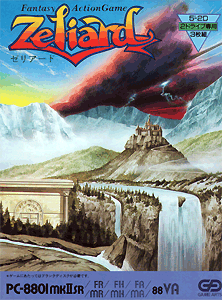PLATFORM ADVENTURE
First Generation (1986-1993)
This period is when many of the puzzle pieces that make up what a platform adventure game is seem to come together, thanks in part to what came before in terms of platformers but also the impact that games like The Legend of Zelda, Dragon Quest and Dragon Slayer II: Xanadu had, particularly on the Japanese developers who also played them a bit earlier. While games like the early Ultimas and Wizardrys had planted the seed, those three were important in showing how to create a more streamlined and (in Zelda's and Xanadu's case) action focused experience while retaining the sense of growth and exploration you could get from RPGs.
Close to the release and quick success of the first Zelda and Super Mario Bros, Nintendo created the first Metroid - a game in which they essentially merged the main concepts of both previous hit titles while further developing on things like multi-use tools as well as movement abilities used to progress. In addition, they created an Alien-influenced world for the player to explore, where they would be completely on their own in one large, almost fully interconnected underground maze or dungeon full of enemies.
With Zelda II, another early Platform Adventure game, you can see an even clearer RPG influence in its separate overworld with enemies moving around that trigger side view encounters in real-time when moved into (something that Xanadu seems to have pioneered though in that case the perspectives were flipped), towns with quest giving NPCs and an experience point-based leveling system which also allowed for manual stat distribution.
Throughout the late '80s, various other hybridizations between platformers and RPGs or Action Adventure games came out of Japan, with a varying focus on mechanics and different approaches to game structure. Some of the more notable ones are Brain Breaker (a pre-Metroid example), Milon's Secret Castle, Legacy of the Wizard/Dragon Slayer IV, Zeliard, Rygar, Faxanadu (a spinoff of Xanadu), Castlevania II, Maze of Galious, Blaster Master, Zillion, Clash at Demonhead, Ys III and Wonder Boy III.
On the western side, it seems the ambition was often either to meld Platformers with Quest- and Point & Click Adventure games, make collectathon and maze platformers or to make advancements in terms of technology, realism and immersion, which is seen in games like Dizzy and Dan Dare, and games like Exile and Mercenary, respectively. However, it is a little known fact that the (unintentional?) innovators of this subgenre were western - their games just did not make much of an impact on other games, or at least not impact that was recognized much by publications at the time or later.
Part of that is possibly due to more of a split between computer and console gaming markets, and/or less of an integration between Japan and the west. Whichever the reason, games like Below the Root (1984), Journey to the Centre of the Earth (1984) and Hero of the Golden Talisman (1985) combined the basic concepts before the first Metroid did, while the game Impossible Mission (1984) seems to have influenced Sega's Zillion. You've most likely never heard of the first three. Some post-Metroid western developed games did take things in a more Metroid-like direction, such as the aforementioned Exile, as well as Antiriad, Black Magic, Rad Gravity and Ghoul School, it just didn't happen on the same scale or with the same impact.
Western RPG developers seemed to prefer the first person perspective and a game called Dungeon Master became the new standard for real-time gameplay in this genre for a few years to come, after which we see an interesting development in the addition of jumping to the Ultima Underworld games and the more obscure, more Doom-like game Shadowcaster. After some consideration I decided to include these and some later games that they influenced here, since although the perspective shift obviously affects how they are played and the kinds of puzzles and challenges you'll encounter, they'll probably be of some interest to a fan of the Platform Adventure genre.
While you'd expect big leaps with the advent of the 16-bit systems, advancements within the PA genre came at a slower pace during their first years. Metroid went portal, and many of the better games from the previous console generation sadly didn't receive sequels. Luckily we did keep getting Monster World/Wonder Boy games and the releases of Ufouria and Gargoyle's Quest II meant the genre went out with a bang on the NES.
List Format
Youtube Playlist (WIP)
Feature Spreadsheet (WIP)

























































































